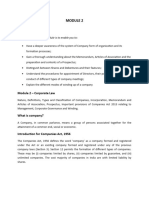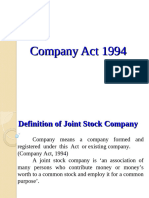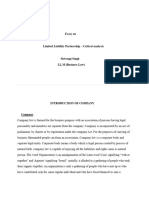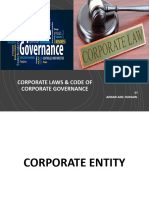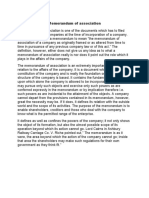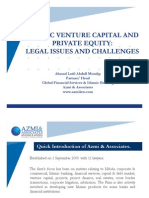0 ratings0% found this document useful (0 votes)
23 viewsCompanies' Act, 2013
Companies' Act, 2013
Uploaded by
Abhimanyu VermaThe document defines key terms related to companies under the Companies Act 2013 in India, including:
- A company is defined as one incorporated under the Companies Act or previous company laws.
- Private and public companies are distinguished based on restrictions on share transfers, maximum number of members, and ability to invite public subscription.
- Other types of companies include one-person companies, companies limited by shares or guarantee, unlimited companies, and foreign and government companies.
- The distinctions between companies and partnerships are outlined, and the doctrine of lifting the corporate veil is explained along with cases where it may apply.
Copyright:
© All Rights Reserved
Available Formats
Download as PPTX, PDF, TXT or read online from Scribd
Companies' Act, 2013
Companies' Act, 2013
Uploaded by
Abhimanyu Verma0 ratings0% found this document useful (0 votes)
23 views70 pagesThe document defines key terms related to companies under the Companies Act 2013 in India, including:
- A company is defined as one incorporated under the Companies Act or previous company laws.
- Private and public companies are distinguished based on restrictions on share transfers, maximum number of members, and ability to invite public subscription.
- Other types of companies include one-person companies, companies limited by shares or guarantee, unlimited companies, and foreign and government companies.
- The distinctions between companies and partnerships are outlined, and the doctrine of lifting the corporate veil is explained along with cases where it may apply.
Original Title
Companies’ Act, 2013
Copyright
© © All Rights Reserved
Available Formats
PPTX, PDF, TXT or read online from Scribd
Share this document
Did you find this document useful?
Is this content inappropriate?
The document defines key terms related to companies under the Companies Act 2013 in India, including:
- A company is defined as one incorporated under the Companies Act or previous company laws.
- Private and public companies are distinguished based on restrictions on share transfers, maximum number of members, and ability to invite public subscription.
- Other types of companies include one-person companies, companies limited by shares or guarantee, unlimited companies, and foreign and government companies.
- The distinctions between companies and partnerships are outlined, and the doctrine of lifting the corporate veil is explained along with cases where it may apply.
Copyright:
© All Rights Reserved
Available Formats
Download as PPTX, PDF, TXT or read online from Scribd
Download as pptx, pdf, or txt
0 ratings0% found this document useful (0 votes)
23 views70 pagesCompanies' Act, 2013
Companies' Act, 2013
Uploaded by
Abhimanyu VermaThe document defines key terms related to companies under the Companies Act 2013 in India, including:
- A company is defined as one incorporated under the Companies Act or previous company laws.
- Private and public companies are distinguished based on restrictions on share transfers, maximum number of members, and ability to invite public subscription.
- Other types of companies include one-person companies, companies limited by shares or guarantee, unlimited companies, and foreign and government companies.
- The distinctions between companies and partnerships are outlined, and the doctrine of lifting the corporate veil is explained along with cases where it may apply.
Copyright:
© All Rights Reserved
Available Formats
Download as PPTX, PDF, TXT or read online from Scribd
Download as pptx, pdf, or txt
You are on page 1of 70
Companies’ Act, 2013
BMS 3M and 3FB
Definition of a Company
• Section 2 (20): A company means a company incorporated under this act or any previous
company law. Previous company law means Companies Act, 1956 or an earlier act.
• The main objects underlying the Companies’ Act, 2013:
1. To revise the law so as to enable a compact statute
2. To incorporate international practices into the company legislation
3. To enable greater flexibility in procedural aspects
4. To provide a framework for responsible self-governance for companies, coupled with strong
disclosures
5. To protect the interests of large number of shareholders
6. To safeguard the interest of creditors
7. To help the development of companies in India on healthy lines because corporate form of
business constitutes an important sector of the economy
Salient Features of a Company Form of
Organisation
• Incorporated association
• Artificial legal person
• Separate legal entity
• Perpetual existence
• Common seal
• Limited liability
• Free transferability of shares
• Registration
• Capacity to sue and be sued
• Separate Property
Distinction between Company and
Partnership
• In partnership, registration is not compulsory. In company, registration
is compulsory.
• Partnership membership: min 2, max 10 (in banking) and 20 (in other
business). Company membership: min 2, max 200 (private company),
min 7 and max no limit (public company). There is 1-person company
also.
• A partnership has no separate legal status, a company has separate
legal status.
• The property of the firm is the property of partners. The property in
the company belongs to the company.
• Management vests in the hands of all partners, except in case of
sleeping or dormant partners. In case of company, management vests
in the board of directors.
• Partnership has no perpetual existence; company has a perpetual
existence.
• Liability of partners is unlimited; creditors are creditors of the
company, not the individual shareholders.
• A partner cannot transfer his interest without the consent of other
partners, but shares are freely transferable in case of public company.
• Accounts need not be audited in case of a partnership, but they have
to be audited in case of a company.
• Death of a partner brings dissolution; death of a member will not
affect the existence of a company.
• Every partner is an agent of each other; shareholders are not the
agents.
Doctrine of Lifting of Corporate Veil
• Even though company has a distinct entity in reality, it is an
association of persons who are in fact the beneficial owners of the
corporate property. The persons behind a company are disregarded
once they have formed a company and given to their association a
status of legal entity. However, there are cases when the corporate
veil of the company will be probed and lifted. The cases in which the
doctrine of lifting of corporate veil has been applied can be put under
2 categories:
1. Cases under judicial interpretation
2. Cases under statutory provisions
Cases under Judicial Interpretation
• Determination of the character of the company
• Company acting as an agent of shareholders
• Benefit of revenue
• Evasion of statutory obligations
• Fraudulent schemes
• Diversion of business opportunity
• Avoidance of welfare legislation
• Determination of the expertise of the company
Cases under Statutory Provisions
• Holding and subsidiary company relationship
• Investigation into the affairs of the company
• Investigation of the ownership of the company
• Directors with unlimited liability
• Fraudulent conduct of business
• Failure to return the application money
• Misrepresentation in prospectus
• Misdescription of name
• Liability of promoters for pre-incorporation contract
• Ultra-vires act
• Liability under other statutes
Illegal Association
• Section 464 of the act provides that no association or partnership consisting
of more than 50 persons shall be formed to carry any business for gain unless
it is registered under the Companies’ Act or any other Indian law. If it is not
registered, it would be considered as an illegal association.
• Rules for counting number of persons: Every person (human, legal or
otherwise) who holds an independent position in law and is capable of
entering into contracts will count as one person in the constitution of a
company for the purpose of counting the number of persons, under Section
464. Accordingly, a company or a joint Hindu family will be counted as one
person. But a partnership has no separate entity, partners will be counted as
separate members. Two or more persons holding the shares jointly will be
treated as single person.
Consequences of Illegal Association
• No legal existence
• Unlimited personal liability of the members
• It cannot enter into a contract.
• It cannot sue its own members or outsiders.
• It cannot be wound up or dissolved.
• It cannot become a legal association.
• Every member shall be liable to pay a fine and profits made will be
liable for income tax.
Classification of Companies
Kinds of companies according to mode of incorporation:
1. A statutory company is incorporated by a special act passed either
by the central or state legislature.
2. An incorporated or registered company is a company registered
under the Companies’ Act.
Kinds of registered companies:
1. Private company: According to Section 2 (68), private company
means a company which has a minimum paid up share capital as
may be prescribed and which by its articles of association:
a) Restricts the right of members to transfer its shares
b) Limits the number of members to 200, excluding the members who
are or were in employment of the company
c) Prohibits the invitation to public to subscribe for any securities of
the company
2. Public company: Section 2 (71) says a public company is one which is
not a private company. It has a minimum paid up share capital as may be
prescribed. It can be a private company which is a subsidiary of a
company which is not a private company. Elaborating the above
definition, a public company is one which:
a) Does not have any restriction on the transfer of shares
b) Does not limit the maximum number of persons
c) Can invite public for the subscription of its securities
It may be noted that a private company, which is a subsidiary of a public
company, shall be deemed to be a public company.
3. One-person company – Section 2 (62) defines one-person company
as a company which has only one person as a member. The said person
shall be a natural person and it is incorporated as a private company
and the words “one-person company” shall be mentioned in the
brackets below the name of the company, wherever it is printed, affixed
or engraved.
Kinds of registered companies on the basis of liability of members:
1. Companies limited by shares: Section 2 (22) says that a company having
the liability of its members limited by the memorandum to the amount
if any, unpaid on the shares respectively held by them is termed as a
company limited by shares.
2. Companies limited by guarantee: Section 2 (21) says a company limited
by guarantee is defined as a company having the liability of its members
limited by its memorandum to such an amount as the members may
respectively thereby undertake to contribute to the assets of the
company in the event of it’s being wound up. For eg, companies formed
for the promotion of commerce, art, science, culture, etc.
3. Unlimited companies: Section 2 (92) says that a company having no
limit on the liability of its members is an unlimited company. That
means the liability of members may extend to personal property of the
members.
Other kinds of companies:
1. Companies with charitable objects or companies not-for-profit:
Section 8: It is an association of persons proposed to be registered as a
limited company for promoting commerce, art, science, religion,
charities, sports, education, research, social welfare, protection of
environment or any other useful object and which does not intend to
apply profits for the payment of dividend to its members and instead
apply the income for promoting these objects. And they can obtain a
license from the government and can get registered as a company with
limited liability, without adding to its name the words ‘limited’ or ‘private
limited’.
2. Foreign company: Section 2 (42) says it’s a company or a body corporate
incorporated outside India which has:
a) A place of business in India, whether by itself or through an agent,
physically or through electronic mode.
b) Conducts any business activity in India in any other manner.
3. Government company: Section 2 (45) defines government company as a
company in which not less than 51% of the paid up share capital is held by
the central government or by any state government or governments or
partly by central government and partly by one or more state governments.
It includes a company which is a subsidiary of such a government company.
4. Holding and subsidiary companies: Section 2 (46) says holding company in
relation to one or more other companies means a company of which such
companies are subsidiary companies. The above definition indicates that there is
no such thing as a holding a company as of itself by constitution and that there
can be no holding company except where there are one or more subsidiaries.
5. Subsidiary companies: Section 2 (87) says subsidiary company or subsidiary in
relation to any other companies (that is to say the holding company) means a
company in which the holding company
a) Controls the composition of board of directors or
b) Exercises or controls more than half of the total voting power either on its
own or together with one or more of its subsidiaries
Distinction between a Private Company and a
Public Company
Private Company Public Company
• Minimum number of persons required is 2. • Minimum number of persons required is
• Maximum number of persons required is 200, 7.
excluding members who were or are in the • No such maximum limit.
employment of the company.
• Minimum number of directors is 3.
• Minimum number of directors is 2.
• The right to transfer shares is restricted by • Shareholders can freely transfer the
articles. shares.
• It prohibits invitation to public to subscribe • It can invite public to subscribe for its
for securities of company. securities.
• It prohibits any invitation or acceptance of • It can invite or accept deposits from the
deposits from public. public.
• It may issue securities only through • It may issue securities to public through
private placement. prospectus or through private placement
• It can proceed to allot securities without (Section 23).
having to wait for minimum subscription. • It cannot allot securities without raising
minimum subscription (Section 39).
• It may issue securities in physical or
dematerialised form. • A public company making public offers
shall issue securities only in
• It is not required to comply with certain dematerialised form (Section 29).
provisions and restrictions relating to
directors. • There is a requirement of retirement of
directors by rotation (Section 152 (6)).
• There is no restriction on remuneration
• Overall managerial remuneration is fixed
to be paid to directors and managing
at 11% of the annual profits (Section 197).
directors.
Formation of a Company
• The process of forming a company can be divided into the following
distinct stages:
1. Promotion
2. Registration and incorporation
3. Commencement of business
Promotion
• It refers to the entire process by which a company is brought into existence.
• The promoters are the persons who conceive the company and invest the initial funds. They enter into
preliminary contracts with the vendors, make arrangement for the preparation, advertisement,
circulation of prospectus and placement of capital.
• A person who just acts in a professional capacity like a lawyer or a chartered accountant who just assists
the promote, who may get paid, is not a promoter.
• Section 2 (69) defines promoter. Promoter means a person:
a) who has been named as such in the prospectus and identified by the company in the annual return
referred to in Section 92.
b) Or, who has control over the affairs of the company, directly or indirectly, whether as a shareholder,
director or otherwise.
c) In accordance with whose advice, instruction or directions, the board of directors of the company are
accustomed to act.
• Nothing in this section shall apply to a person who is acting merely in a professional capacity.
Functions of the Promoter
• To conceive the idea of starting the business and explore its possibilities
• To undertake detailed technical, economic and commercial feasibility of business proposition
• To conduct negotiation for the purchase of business in case it intends to purchase an existing
business
• To collect the requisite number of persons (2 and 7) who can sign the memorandum and
articles and also agree to act as first directors
• To decide the following: nature of the company, location of registered office, amount and form
of initial capital, underwriters and brokers of the capital issue.
• To get the memorandum and articles drafted
• To enter into preliminary contracts with vendors and underwriters
• To arrange for the preparation of prospectus, filing, advertising and issue of capital
• To arrange for the funds required for the company
Legal Position of the Promoters
• The promoter can neither be termed as agents or trustees of the
company but they have wide powers relating to the formation.
• Law has the relationship of the promoter with the company they
bring into existence as well as those whom they induce to become
shareholders in it as that of fiduciary nature. The fiduciary
relationship is based on utmost faith and confidence. Those who
accept and use such extensive powers are not entitled to disregard
the interest of the corporation altogether.
Duties of the Promoter
• They must not make any secret profits out of promotion, without making
disclosures.
• They must make the disclosure of all material facts relating to the formation
of the company.
• If the promoters fail to fulfill these duties,
1. the company can rescind or cancel the contract.
2. the profits made by the promoters may be recovered.
3. They can retain the property, paying no more for it, depriving the secret
profits.
4. The company can even sue them for the breach of trust.
Liabilities of the Promoter
• The promoter can be compelled to hand over the secret profit.
• They will be personally liable for the preliminary contracts.
• They will be liable for false and incorrect information or suppression of material facts of which
they are aware in any document filed with the registrar (Section 447).
• An investigation may be ordered against the promoter for any fraudulent activity (Section 282).
• A company can also proceed against a promoter where a promoter wrongfully obtains the
possession of any property including cash, or wrongfully withholds it or applies it for any other
purpose, other than those expressed in the articles or authorized by the act (Section 452).
• Promoters will be personally liable for the omission of any particulars as required by the act in
the prospectus (Section 26).
• Misrepresentation in the prospectus: Subscribers can also sue promoters for any compensation
for any loss or damage (Section 35).
Incorporation
• Section 3 (1): A company may be formed for any lawful purpose:
a) 7 or more persons where the company to be formed is a public company
b) 2 or more persons where the company to be formed is to be a private company
c) 1 person company where the company to be formed is a one-person company, that is to say, a
private a company
by subscribing their names or his name to a memorandum and complying with the requirement of
the act in respect of registration.
• A company formed under subsection 1 may be either a company limited by shares, a company
limited by guarantee or unlimited company.
• Preliminary contracts are those entered into by the promoters on behalf of the company before
incorporation with the third parties.
• When the registrar is satisfied with the compliance of the procedure with the details given in the
application, he will issue a certificate of incorporation.
Effect of Registration
• Section 9
• From the date of incorporation mentioned in the certificate, such subscriber to
the memorandum and all the persons as may from time to time become
members of the company shall be a body corporate by the name contained in
the memorandum, capable of exercising all the functions of the incorporated
company under the act and shall have perpetual succession and a common seal
and power to acquire, hold or dispose off the property, to contract and to sue
and be sued by the said name.
• Certificate of incorporation is conclusive proof of the legal existence of the
company. The life of the company begins from the date written on the
certificate. It is also a proof showing that all the requirements of Companies Act,
2013 have been complied with.
Commencement of Business
• Section 11
• Section 11 (1): A company having share capital shall not commence any business or exercise
borrowing power unless
a) A declaration is filed by a director in such form and verified in such manner as may be prescribed
with every registrar that every subscriber to the memorandum has paid the value of the shares
and agreed to be taken by him.
b) The company has filed with the registrar verification of the registered office as provided in Section
12 (2).
• If any default is made in complying with these requirements, the company shall be liable for a
penalty which may extend to Rs.5,000 and every officer in default shall be punishable with a fine,
which may extend to Rs.1,000 for every day during which the default continues.
• Where no declaration has been filed with registrar, under Section 11 (1)(a), within a period of 180
days of incorporation, the registrar has a reasonable cause to believe the company is not carrying on
any business or operation. He may initiate an action for the removal of the name from the register.
Preliminary Steps
The promoters have to go through the following steps before applying for the
incorporation of the proposed company:
1. As per Section 4(2), a company cannot be registered with the name which is
considered undesirable in the opinion of the central government. The name should not
be identical or resemble to the name of the existing registered company under this act
or any previous company law. The promoters are advised to make an application, in
Form 1 (a) to ascertain the availability of maximum 6 names in the order of preference.
2. A fee of Rs.500 has to be paid along with the digital signature of the applicant,
proposing the company, has to be attached in the form. If the proposed name is not
available, the applicant has to apply for a fresh name on the same application.
3. After the name has been approved, the applicant can apply for registration of the new
company by filing the required forms within 60 days of the approval of the name.
4. Before the incorporation, the promoters have to appoint a chartered
account, lawyer, etc. to help them in preparing various documents.
5. Then they have to arrange for the drafting of memorandum and
articles by the solicitor and submit the same to the registrar and print
the same.
6. The memorandum and articles must be signed by at least 7
subscribers in the case of public company and 2 in the case of private
company, with address, description, occupation (if any), in the presence
of at least one witness. The subscriber should also mention the number
and nature of shares subscribed for.
Adoption of Preliminary Contracts
The company may adopt preliminary contracts in the following ways:
1. The company may adopt those contracts by entering into new contracts on the same
terms embodied in the original contract. Such a new agreement of adoption may be
expressly made or may be implied by the acts of the company.
2. The company may adopt these under Specific Relief Act, 1963, Section 15 (h) and Section
19 (e). The contracts entered into by the promoters on behalf of the company before its
incorporation can be enforced by or against the company if the following conditions are
satisfied:
a) The contract is entered into for the purposes of the company and such contract is
warranted by the terms of incorporation. It implies that the contract should be for the
working purpose of the company.
b) The company accepts the contract after incorporation and communicates such
acceptance to the other party to the contract.
Certificate of Incorporation
• This is a legal document relating to the formation of the company,
which confirms the name by which the company is registered, and the
date of incorporation. The registrar issues it in prescribed form on the
basis of the submission of the required document.
Consequences of Certificate of Incorporation
• It brings the company into existence from the date mentioned.
• It grants legal personality, corporate existence and perpetual
succession.
• The subscriber to the memorandum together, with such other
persons, as from time to time, become members of the company,
which becomes a body corporate, with distinct entity, having
perpetual succession with limited liability of members.
• Memorandum and articles become binding upon the members and
the company as if they have been signed by the company and the
members.
Validity of Certificate of Incorporation
• It is a legal evidence with regard to the incorporation and formation
of the company. According to Section 7 (6) of the Companies Act,
where at any time after the incorporation of the company, if it is
proved that the company has got incorporated by furnishing false or
incorrect information in any of the documents, or by any fraudulent
action, the persons named as the directors of the company, and the
persons making such declaration, shall be liable for action under
Section 447 of the Companies Act.
Memorandum of Association
• Section 2 (56): Memorandum of association of the company is the memorandum of
association as originally framed or as altered from time to time in pursuance of any
previous company law or of this act. The important purpose of memorandum is that it
enables the intending shareholders to know the field of the activity or to what purpose
the money is going to be used by the company, and what risk the investor is taking in
making the investment.
• Similarly, anyone who is dealing with the company will also know whether the
transaction he intends to make is within the objects of the company.
• Memorandum has to be signed by subscribers (7 and 2) in the presence of witness,
with all the particulars. It is a public document and any person who deals with the
company is presumed to have sufficient knowledge of its contents. On being required
by a member, company has to provide memorandum on payment of prescribed fee,
within 7 days.
Clauses of Memorandum
• Name clause: A company being a distinct legal entity must have a name of its own, in
order to establish its identity. The general rule is that company can be registered with any
name, subject to the following restrictions:
1. The last words of the name must end with limited or private limited.
2. As per Section 4 (2), no company can be registered with the name which is undesirable
in the opinion of central government. If the name is identical, or closely resembles the
name of an existing company, it may be deemed to be undesirable by the central
government.
3. The name adopted should not violate the provisions of Emblems and Name Act, 1950.
4. The name should not connote government participation or patronage unless the
circumstances justify the use of such words. It should not include the words
cooperative, bank, banking companies or insurance, unless the circumstances justify it.
• Situation Clause: Memorandum of association must state the name of the
state in which the registered office of the company is to be situated. It is
important for 2 reasons:
1. It determines the domicile of the company. It establishes the jurisdiction
of the high court of the state in which the registered office is situated.
2. It is the place where the statutory books are normally kept and notices
and other communications are sent.
• A company need not carry its business at the registered office. They can
have a registered office in one state and business in another. Every
company must have a registered office within 15 days of incorporation.
• Object Clause: It is the most important clause in the memorandum
and the company cannot do anything beyond or outside its objects.
Any act done beyond it will be ultra-vires and void. According to
Section 4 (c), the memorandum must state the objects for which the
company is incorporated, and any other matter considered necessary,
for the furtherance of the same.
• Alteration of Object Clause: Section 13 (8)
• A company which has raised money from the public through prospectus and still has any unutilized amount out of the
money so raised, shall not change its object clause unless:
• A special resolution is passed by the company through the postal ballot and the notice in respect of the resolution shall be
sent, which should also contain the following particulars:
a) Total money received
b) The money utilized for the objects stated in the prospectus
c) The unutilized amount of the money so raised through the prospectus
d) The particulars of the proposed alteration or change of objects
e) The amount proposed to be utilized for new object
f) The estimated financial impact of the proposed alteration on earnings and cash flow
g) Any other relevant information which is necessary for the members to take an informed decision
h) The place from where any interested person may obtain a copy of the notice of resolution to be passed
i) The details of the resolution shall also be published in the newspapers.
j) The dissenting shareholders shall be given an opportunity to exit by the promoters.
• In case of companies not having raised money through prospectus,
can change the object clause by passing special resolution.
• The registrar shall register the alteration with respect to objects and
certify the registration within 30 days from the date of filing the
special resolution.
• Liability Clause: Ordinarily, the liability of the members is limited and
this clause cannot be altered to make the liability of members
unlimited. However, alterations which are likely to impose additional
liability on members, or which are likely to compel a member to buy
additional shares of the company, after the date on which he has
become a member, cannot be made except with the consent of the
member concerned in writing. Liability clause mentions that the
liability of members is limited in both company limited by shares and
company limited by guarantee (Section 4 (1) (d)).
• Capital Clause: Memorandum of association of a company having
share capital and company limited by guarantee having share capital
must also state the amount of the capital with which the company is
to be registered which is called authorized or nominal capital and
division of the capital into shares of a fixed amount and each
subscriber to the memorandum must take at least one share and
write opposite his name the number of shares he agrees to take.
• Association Clause: This clause states that persons subscribing their
signatures at the end of memorandum of association are desirous of
forming themselves into an association in pursuance of memorandum
of association, must be signed at least by 7 persons in case of a public
company and 2 in case of a private company. It should be attested by
a witness. Subscribers cannot become witness. All the details of the
subscribers and the witnesses must be written. In case of company
with share capital, each subscriber must take at least one share and
number of shares taken by them must be written opposite to each
subscriber’s name. They must also sign the articles of association.
Articles of Association
• Articles of association is an important document which contains the
rules, regulations and by-laws for the internal administration of the
company.
• Section 2(5): Articles of association means the articles of association
as originally framed or as altered from time to time in pursuance of
the previous company law or of this act.
Relationship of Memorandum and Articles
• Memorandum is the charter of the • Articles lay down the rules and regulations
company and describes the to manage its affairs.
constitution of the company and • Articles are subordinate to the provisions of
defines scope of the activities and the memorandum.
powers. • Articles of association constitute of contract
• Memorandum contains an area between the company and members in
their capacity as members.
beyond which the company cannot go.
• Articles can be altered by passing a special
• Memorandum of association contains resolution and even retrospectively.
the conditions for the use of creditors, • Articles can be used to explain the objects
shareholders and outside public. laid down in the memorandum but can
• It is difficult to alter the memorandum never extend them or modify the provisions
of association. of memorandum.
Contents of Articles
1. Definition of important terms and phrases
2. Share capital and the rights attached to different classes of shares
3. Procedure as to make calls and forfeiture of shares
4. Appointment of managerial personnel, their retirement by rotation,
powers and duties
5. Rules as to
a) Transfer and transmission of shares
b) Issue of share certificate
c) General meeting
d) Common seal of the company
e) Dividend, reserves and capitalization of profits
f) Accounts and audit
g) Lien on shares
h) Remuneration of managerial personnel
i) Issue of redeemable preference shares
j) Paying commission and fixing rate thereof
k) Paying interest out of capital
l) Winding up of the company
Procedure for Alternation
• Section 14: A company may, by passing a special resolution at any
time, alter the articles. A copy of every special resolution altering the
articles must be filed with the registrar, within 15 days of its passing.
Any alteration so made shall be valid as if originally contained in the
article.
Adoption and Application of Table F
• There are 3 alternative forms in which a public company may adopt
the articles.
1. It may adopt Table F in full.
2. It may wholly exclude Table F and set out its own articles in full.
3. It may frame its own articles and adopt part of Table F.
• Unless the articles of a public company expressly exclude any or all of
the provisions of Table F, Table F shall automatically apply to it.
Prospectus
• A public company may raise its capital by way of public offer and a public offer may
be initial public offer (IPO) or further or follow-on public offers.
• Section 2 (70): Prospectus means any document described or issued as prospectus
and it includes a red-herring prospectus, referred to in Section 32, or shelf
prospectus, referred to in Section 31, or any other notice, circular, advertisement or
other document, inviting offers from the public, for the subscription or purchase of
any securities of a body corporate.
• Any document which has the object of securing the required capital or public
deposits for a company, comes within the definition of prospectus.
• An offer or invitation to any section of the public, whether selected as members of
any organization, association, or clients of a person, will be taken as invitation to
public.
Allotment of Shares
• Registration of prospectus Section 26 (4): In case of a public offer, a company is
required to file a copy of the prospectus with the registrar.
• The amount stated in the prospectus as minimum subscription must have been
subscribed.
• A sum of at least 5% of nominal value of shares must be received as cash as
application money.
• All application money received should be kept in a separate bank account in a
scheduled bank.
• Return of application money: If the stated minimum amount has not been
subscribed on application within a period of 30 days of issue of prospectus, the
amount received from the applicant shall be returned within a period of 15 days
from the closure of such issue.
• Return of allotment: Where a company having share capital makes
allotment, it must file with the registrar, a return of allotment in the
prescribed manner.
• Penalty: In case of any default, the company and its officers shall be
liable to pay penalty.
• Securities to be dealt with stock exchange: Listing of all public issues
with any stock exchange is compulsory and prospectus should state
the name of stock exchanges and no allotment of securities can be
made if the permission for listing is not obtained by the company
within the time prescribed by saving.
Issue of Sweat Equity Shares
• Section 54 of the act provides for issue of sweat equity shares.
• Section 2 (88) defines sweaty equity shares as such equity shares as
are issued by the company to its employees or directors at a discount
(at a price less than market price) or for consideration other than cash
for providing their know how or making available the rights in the
nature of intellectual property rights or value addition by whatever
name called.
• All the provisions of equity shares are applicable to it.
• A company may issue sweat equity shares if the following conditions are
fulfilled:
1. The shares must be of a class already issued.
2. At least one year must have elapsed since the company had commenced
the business.
3. The issue must be authorized by special resolution passed at the AGM.
4. The resolution must specify the number of shares, their current market
price, consideration if any and the class and classes of directors and
employees to whom they are to be issued.
5. It must be issued in accordance with the regulations of SEBI.
Bonus Shares
• A bonus issue occurs when a company does not distribute the profits and
reserves by way of dividend but retains them and uses them to issue fully
paid shares. The shares so issued are called bonus shares. It implies the
payment of dividend in the form of shares. The new shares are allotted
to equity shareholders in proportion to their existing shareholding.
• Section 63 (1) provides that a company may issue fully paid up bonus
shares to the members out of:
1. Its free reserves
2. Security premium account
3. The capital redemption reserves account
Conditions for Issue of Bonus Shares
• Section 63 (2 and 3)
• The articles of association must authorize the capitalization of profits or reserves for the
purpose of issue of bonus shares.
• Suitable resolution of board of directors must be passed.
• Formal approval of shareholders in the general meeting must be secured.
• Company has not defaulted in the payment of interest or principal in respect of FDs or
debentures issued.
• The company has not defaulted on the payment of statutory dues such as PF, bonus,
gratuity etc.
• The partly paid-up shares, if any existing, on the date of allotment, bonus shares must be
fully paid-up.
• The company must comply with such conditions as may be prescribed.
Allotment of Further Issue of Shares (Rights
Issue)
• Section 62 lays down the manner of further issue of shares, whether equity or
preference shares to be allotted. There should be equitable distribution of shares
without distorting the established equilibrium. This section further provides the
following conditions, which must be fulfilled, when the company proposes to
increase the subscribed capital by allotment of further shares:
1. The offer must be made to the present equity shareholders on pro rata basis.
2. The pro rata offer must be made by giving a notice specifying the number of
shares offered, limiting the time not less than 15 days and not exceeding 30 days
of the offer. If the offer is not accepted, it is deemed to have been declined.
3. The members must be given the right of renunciation of offer in favour of the
nominee, unless the articles otherwise provide.
Directors
• Section 2 (34) defines director, saying it means a director appointed to
the board of the company.
• Section 179 expressly vests the management of the business of a
company in its directors; board is the supreme policy framing and
decision-making organ of the company.
Legal Position of Directors
• As agents
• As trustees
• As managing partners
• Who can be appointed as a director?
1. No body corporate, association or a firm shall be appointed as a
director of a company. Only an individual shall be appointed.
2. A person who has been appointed must have be allotted a director
identification number.
Qualification of Directors
• The act does not lay down any academic or share qualifications, but if
the articles provide for certain qualification shares for a director, the
nominal value of such shares should be kept low, so that even an
ordinary shareholder may think of becoming a director.
Duties of Directors (Section 166)
• The director should act in accordance with the articles of association.
• The directors of a company shall act in good faith to promote the objects of the company.
• The director shall exercise the duties with due and reasonable care, skill and diligence.
• A director shall not involve in a situation in which he may have a direct or indirect interest
which may conflict with the interest of the company.
• A director shall not achieve or attempt to achieve any undue gain or advantage either for
himself, or partners, or associates.
• The director shall not assign his office or assignment. If so made, it will be void.
• They must not be negligent.
• They must perform their duties personally and cannot delegate further, unless specially
permitted by articles.
Number of Directorships (Section 165)
• No person, after the commencement of this act, shall hold the office
of the director, including any alternate directorships, in more than 20
companies at the same time.
• The maximum number of public companies in which a person can be
appointed as a director shall not exceed 10.
• Subject to the provisions of subsection 1, the members of a company
may, by a special resolution, specify any less number of companies, in
which the director of the company may act as a director.
Company Meetings
• AGM: Every company must, in each year, hold in addition to any other meeting, a general
meeting (Section 96 (1). It is held each other with a view to review and evaluate the overall
progress of the company during the year. The following ordinary business must be transacted
in the AGM every year (Section 102 (2)):
1. Consideration of the financial statements and reports of the board of directors and auditors
2. The declaration of dividend if any
3. Appointment of directors in place of retiring directors
4. Appointment and fixation of the remuneration of auditors
5. Any other agenda will be considered as special business. It is relevant to note that ordinary
business requires ordinary resolution, and special business requires ordinary or special
resolution, as per the articles or the act.
6. One-person company is not required to hold AGM.
• Extraordinary General Meeting: All the other meetings other than
general meeting are called extraordinary general meeting. These may
be convened by the company any time. The business transacted
comprises anything which cannot be postponed till the next AGM. All
business transacted at the meeting is called special business.
Requisites of a Valid Meeting
• Proper convening authority
• Proper notice
• Requisite quorum
• Proper chairperson
Resolutions
• Ordinary resolution: It can be passed by simple majority.
• Special resolution: Votes cast in favour must not be less than three
times the votes against the resolution.
• Resolution requiring special notice: It’s a kind of ordinary resolution
with a difference that the mover of the proposed resolution is
required to give special notice of at least 14 clear days before moving
the resolution.
Minutes
• Minutes means the concise and accurate official record of the
business transacted at the company meeting. It includes the
resolutions passed.
You might also like
- Companies Act 2013: - Heli ShahDocument42 pagesCompanies Act 2013: - Heli ShahHELI SHAHNo ratings yet
- Msop Project PDFDocument40 pagesMsop Project PDFshahabanooNo ratings yet
- Theory Notes Modified PDFDocument28 pagesTheory Notes Modified PDFLubna Afseer100% (1)
- Companies AccountsDocument16 pagesCompanies AccountsdivvyaapNo ratings yet
- Company Law UpDocument95 pagesCompany Law UpAshesh DasNo ratings yet
- Cia 2 4703 MaterialDocument16 pagesCia 2 4703 MaterialMadhan RajaNo ratings yet
- Unit 3-Part 1Document17 pagesUnit 3-Part 1Aman RaiNo ratings yet
- Companies ActDocument9 pagesCompanies ActSnigdhangshu BanerjeeNo ratings yet
- Company LawDocument37 pagesCompany LawHardik KothiyalNo ratings yet
- 128656Document19 pages128656Sita RamNo ratings yet
- Ble NotesDocument28 pagesBle Notesneelam prasadNo ratings yet
- Company Law: Nature of A CompanyDocument151 pagesCompany Law: Nature of A Companychangumangu100% (1)
- Business Law Chpater 07Document48 pagesBusiness Law Chpater 0717.swadhin.0No ratings yet
- Lab 3Document82 pagesLab 3thesharer85No ratings yet
- U1-2-Kinds of CompaniesDocument29 pagesU1-2-Kinds of CompaniesAyush LohiyaNo ratings yet
- Corporate Law I NotesDocument34 pagesCorporate Law I NotessnehalNo ratings yet
- Unit 1Document4 pagesUnit 1David RamanNo ratings yet
- 32 Kinds of CompaniesDocument7 pages32 Kinds of CompaniesShree Kant PrasadNo ratings yet
- Lectures On Company Law-FullDocument73 pagesLectures On Company Law-FullshakilhmNo ratings yet
- Rowshonara Akter Akhi Lecturer Department of Finance & Banking Jahangirnagar UniversityDocument28 pagesRowshonara Akter Akhi Lecturer Department of Finance & Banking Jahangirnagar UniversityRubayet HasanNo ratings yet
- Types of Business and Stock ExchangeDocument28 pagesTypes of Business and Stock ExchangeShireen JahangirNo ratings yet
- Assignment 1Document8 pagesAssignment 1nikhilsharma1942003No ratings yet
- Overview On The Companies Act, 1994Document44 pagesOverview On The Companies Act, 1994Tawsif MahbubNo ratings yet
- Shivangi Singh LL.M (Business Law)Document99 pagesShivangi Singh LL.M (Business Law)shivangiNo ratings yet
- LeAB - 5 and 10 Marks - Unit 3Document12 pagesLeAB - 5 and 10 Marks - Unit 3Lalith kumarNo ratings yet
- Mercantile LawDocument21 pagesMercantile LawPriyanka BarikNo ratings yet
- Company Accounting-SummaryDocument18 pagesCompany Accounting-SummaryIgihozo ClaudineNo ratings yet
- B Company LAW - StudentDocument61 pagesB Company LAW - StudentSudipta SarangiNo ratings yet
- 4 TH ChapterDocument15 pages4 TH ChapterKodi NadarNo ratings yet
- Corporate Law AssignmentDocument11 pagesCorporate Law AssignmentGoranshi GuptaNo ratings yet
- Company-Law Concise NotesDocument40 pagesCompany-Law Concise NotesIcap Frtwo100% (4)
- Company Law NotesDocument95 pagesCompany Law NotesAakriti BaderiaNo ratings yet
- Basics of Companies ActDocument6 pagesBasics of Companies Actkavya.aroraNo ratings yet
- COMPANY LAW NOTES Part1Document58 pagesCOMPANY LAW NOTES Part1Satish PatelNo ratings yet
- Company Law 2Document5 pagesCompany Law 2Humaira HossainNo ratings yet
- ENTREPRENURSHIPDocument43 pagesENTREPRENURSHIPRaj YadavNo ratings yet
- Corporate LawsDocument162 pagesCorporate LawsAdnan Adil HussainNo ratings yet
- BBA Corporate Law Module 1 NotesDocument26 pagesBBA Corporate Law Module 1 NotespxrvathypramodNo ratings yet
- Law NotesDocument58 pagesLaw NotesSHERIN REGI VARUGHESE 2022040No ratings yet
- Memorandum of AssociationDocument6 pagesMemorandum of AssociationAhmedkhayyamNo ratings yet
- 3 The Companies Act 1956Document12 pages3 The Companies Act 1956sagarbandiganiNo ratings yet
- Class 12 Accountancy Part 2 Ncert Textbook (Rationalised 2023-24)Document297 pagesClass 12 Accountancy Part 2 Ncert Textbook (Rationalised 2023-24)msweta2307No ratings yet
- New Comapany Act 2013Document30 pagesNew Comapany Act 2013sowjanya kandukuriNo ratings yet
- Probable QuestionsDocument15 pagesProbable QuestionsSanjeev RawatNo ratings yet
- Accounting For Corporation TopicsDocument8 pagesAccounting For Corporation Topicsjnh62wv8zfNo ratings yet
- Company Law 2013Document191 pagesCompany Law 2013Vetri VelanNo ratings yet
- Prepared and Presented By,: N. Ganesha Pandian Assistant Professor Madurai School of Management MaduraiDocument121 pagesPrepared and Presented By,: N. Ganesha Pandian Assistant Professor Madurai School of Management MaduraiSathyanaryanan RajappaNo ratings yet
- CLT Mid Term Notes PDFDocument40 pagesCLT Mid Term Notes PDFDheerajRedENo ratings yet
- Legal Aspects of Business 5 Units NotesDocument57 pagesLegal Aspects of Business 5 Units NotesPraduman SharmaNo ratings yet
- Corporate PersonalityDocument22 pagesCorporate PersonalitysonviNo ratings yet
- NCERT Class 12 Accountancy Part 2Document329 pagesNCERT Class 12 Accountancy Part 2KishorVedpathak100% (2)
- Legal Aspects - Unit-2Document33 pagesLegal Aspects - Unit-2Vikram VikasNo ratings yet
- Company Law - Unit IDocument61 pagesCompany Law - Unit IHarsh ThakurNo ratings yet
- Company LawDocument34 pagesCompany LawMuthu KumaranNo ratings yet
- Company LawDocument5 pagesCompany LawMuthu KumaranNo ratings yet
- Textbook of Urgent Care Management: Chapter 6, Business Formation and Entity StructuringFrom EverandTextbook of Urgent Care Management: Chapter 6, Business Formation and Entity StructuringNo ratings yet
- Microsoft Office Practical QuestionsDocument112 pagesMicrosoft Office Practical QuestionsAbhimanyu VermaNo ratings yet
- Seeking Solitude: The Positive Effects of Being Alone: January 2019Document8 pagesSeeking Solitude: The Positive Effects of Being Alone: January 2019Abhimanyu VermaNo ratings yet
- Jafeb TheEffectofCountry-of-OriginonCustomerPurchaseIntention-AStudyofFunctionalProductsinVietnam DOI1013106jafeb 2017 Vol4 No3 75 PDFDocument11 pagesJafeb TheEffectofCountry-of-OriginonCustomerPurchaseIntention-AStudyofFunctionalProductsinVietnam DOI1013106jafeb 2017 Vol4 No3 75 PDFAbhimanyu VermaNo ratings yet
- Amul BCG Matrix Analysis: StarsDocument3 pagesAmul BCG Matrix Analysis: StarsAbhimanyu VermaNo ratings yet
- Excel What IF Analysis QNDocument2 pagesExcel What IF Analysis QNAbhimanyu Verma100% (1)
- International Marketing and The Country of Origin EffectDocument224 pagesInternational Marketing and The Country of Origin EffectAbhimanyu VermaNo ratings yet
- 2 E-Comm CasesDocument82 pages2 E-Comm CasesAbhimanyu VermaNo ratings yet
- Jafeb TheEffectofCountry-of-OriginonCustomerPurchaseIntention-AStudyofFunctionalProductsinVietnam DOI1013106jafeb 2017 Vol4 No3 75 PDFDocument11 pagesJafeb TheEffectofCountry-of-OriginonCustomerPurchaseIntention-AStudyofFunctionalProductsinVietnam DOI1013106jafeb 2017 Vol4 No3 75 PDFAbhimanyu VermaNo ratings yet
- ACID ICES TestDocument112 pagesACID ICES TestAbhimanyu VermaNo ratings yet
- Case StudyDocument2 pagesCase StudyAbhimanyu Verma0% (1)
- Chapter Two: Company and Marketing Strategy Partnering To Build Customer RelationshipsDocument25 pagesChapter Two: Company and Marketing Strategy Partnering To Build Customer RelationshipsAbhimanyu VermaNo ratings yet
- The Effect of Country of Origin and Prod PDFDocument6 pagesThe Effect of Country of Origin and Prod PDFAbhimanyu VermaNo ratings yet
- New Microsoft Office Excel WorksheetDocument2 pagesNew Microsoft Office Excel WorksheetAbhimanyu VermaNo ratings yet
- Chapter One: Creating and Capturing Customer ValueDocument48 pagesChapter One: Creating and Capturing Customer ValueAbhimanyu VermaNo ratings yet
- Chapter Three: Analyzing The Marketing EnvironmentDocument33 pagesChapter Three: Analyzing The Marketing EnvironmentAbhimanyu VermaNo ratings yet
- Basel NormsDocument42 pagesBasel NormsBluehacksNo ratings yet
- Preference SharesDocument7 pagesPreference SharesVarun LoyalkaNo ratings yet
- Caltex Phil Inc. VS CaDocument1 pageCaltex Phil Inc. VS CaRengie GaloNo ratings yet
- Bvps and EpsDocument30 pagesBvps and EpsRenzo Melliza100% (1)
- Corporate Action - Thomson Reuters.Document12 pagesCorporate Action - Thomson Reuters.adjipramNo ratings yet
- Review Session 6 TEXTDocument6 pagesReview Session 6 TEXTAliBerradaNo ratings yet
- Application of Differential Calculus in Math of Investment: Polytechnic University of The PhilippinesDocument9 pagesApplication of Differential Calculus in Math of Investment: Polytechnic University of The PhilippinesGeralyn MiralNo ratings yet
- William O'Neil QuotesDocument17 pagesWilliam O'Neil QuotesAditya Jaiswal100% (2)
- Daily Stock Watch: TuesdayDocument9 pagesDaily Stock Watch: TuesdayRandora LkNo ratings yet
- Stock Code: 500265 Stock Code: MAHSEAMLES: Nid AlDocument1 pageStock Code: 500265 Stock Code: MAHSEAMLES: Nid AlLalitNo ratings yet
- Islamic VC and PE Legal Framework by Ahmad LutfiDocument36 pagesIslamic VC and PE Legal Framework by Ahmad LutfiZuvyn AhmadNo ratings yet
- Basel in NepalDocument15 pagesBasel in NepalPravin GhimireNo ratings yet
- TOA Reviewer Conceptual FrameworkDocument2 pagesTOA Reviewer Conceptual FrameworkNadine SantiagoNo ratings yet
- Homework 1Document2 pagesHomework 1chatdemNo ratings yet
- Hai PDFDocument17 pagesHai PDFrao159951No ratings yet
- Notification No. FEMA. 20/2000-RB Dated 3rd May 2000Document28 pagesNotification No. FEMA. 20/2000-RB Dated 3rd May 2000RajivShahNo ratings yet
- HRAGO10 30percentDocument3 pagesHRAGO10 30percentnmsusarla999No ratings yet
- Examen de Time Value - Cash Flows - Financial StatementsDocument9 pagesExamen de Time Value - Cash Flows - Financial Statementsecrescy66No ratings yet
- Punkty Swapowe Tms PL 2024.11.25Document42 pagesPunkty Swapowe Tms PL 2024.11.25notatkiemiliaNo ratings yet
- The St. Petersburg ParadoxDocument5 pagesThe St. Petersburg ParadoxLance Lot100% (1)
- Classification of Negotialble InstrumentsDocument1 pageClassification of Negotialble InstrumentsvivekNo ratings yet
- Insurance Awareness PDFDocument20 pagesInsurance Awareness PDFsrutiNo ratings yet
- Capital Budgeting TechniquesDocument2 pagesCapital Budgeting TechniquesmananipratikNo ratings yet
- Niyati MakadiaDocument81 pagesNiyati MakadiaNiyati MakadiaNo ratings yet
- CrisilDocument59 pagesCrisilsarangk87No ratings yet
- Financial Management:: Risk and Return - Capital Market TheoryDocument56 pagesFinancial Management:: Risk and Return - Capital Market TheoryBen OusoNo ratings yet
- 2017 PICA ExcerptDocument226 pages2017 PICA ExcerptohwowNo ratings yet
- First Partn - Answer 2Document5 pagesFirst Partn - Answer 2Monique CabreraNo ratings yet
- Advanced Accounting LupisanDocument25 pagesAdvanced Accounting LupisanDaniel Tadeja53% (17)
- 6 Dividend DecisionDocument31 pages6 Dividend Decisionambikaantil4408No ratings yet





